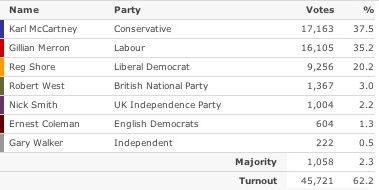I’ll be voting ‘yes’ to AV tomorrow. That’s not to say I particularly want AV as our voting system, but unfortunately we don’t have the option of proportional representation. It’s Alternative Vote or First Past The Post, and I don’t see British politics (or our general attitude to it) improving while FPTP remains in use.
It’s pretty clear to me that our voting system is in need of reform, and a ‘no’ result simply suggests that we’re happy with what we’ve got, thank you very much. I don’t care if AV is flawed or a weak compromise… it’s reform, and democratically driven reform is a good habit to get into. Nothing is forever, either… what’s to stop us going back to FPTP, or even having a three-way referendum with another option?
Both campaigns have annoyed me for different reasons, but with Yes2AV it’s mostly been a case of failing to hammer the point home. Some of the explanations have been dull, unimaginative and over-complicated. If it hadn’t been for a couple of viral online graphics, the Yes campaign would have been dead in the water by now…
Voting Flowchart (from Paperback Rioter)
Let’s AV a beer
It’s No2AV who have come out with some of the most brazen misinformation. In pride of place was their suggestion that AV is much too complex for the average voter. Yep, putting two or more things in order of preference is just so difficult, isn’t it? Most of us have been doing it since primary school, with our favourite sweets, pop groups, football teams, girls, guitars, cars…
The No2AV campaign has praised the simplicity of the FPTP system, and indeed, all you have to do is choose your favourite candidate and stick an “X” by his/her name. Well, that’s what some people do, and you can do that with AV, if you choose to rank only one candidate. But that discounts the huge number of people who vote tactically, voting to hinder an unfavoured candidate, not to help a favoured one. I don’t know about you, but I’ve gone through some pretty complex mental gymnastics on polling days past, trying simultaneously to maximise the damage I can do to one candidate, to assuage my feelings of guilt over not voting for my favourite (no-hoper) candidate and to find a compromise candidate who at least has a vague hope of winning. Simple, eh?
And that’s one of the most important reasons for reform. The weakness of FPTP lies not in what you do, but in what you don’t do. The simplest argument for electoral reform is provided by something that happens up and down the country in every General Election. Here’s what happened in Lincoln in the 2010 election…

What always grabs my attention in statistics like those is that 62.9% of the people voted against the winning candidate. Let’s forget the people who didn’t vote at all, even if their non-vote was intended as a protest. And even if we assume, for the sake of argument, that the four lowest candidates could conceivably be disaffected Tories (although, realistically, at least two of them are just thugs). You’ve still got 55.4% of that constituency’s voters who don’t want the winning candidate.
That’s just one mildly marginal constituency. There are worse examples, where the simplest of choices gives a vague, inconclusive picture of the true opinions of the electorate. And this isn’t just the whinings of a disappointed centre-left tactical voter, either… there’s a whole range of situations where a mixture of tactical voting and policy overlap have led to seats being won unconvincingly. To me, this is an obvious case for reform.
And then there was David Cameron’s claim on Radio 4 that AV results in some people’s votes being counted twice. It’s twaddle. If anything, it’s fairer than FPTP in trying to make everyone’s vote count at all. In the Lincoln example above, if you voted UKIP, your vote was worthless. Under AV, you’ve at least had the chance to form a contingency plan in the shape of your second (or third, etc) choice… “if this vote doesn’t work, please give it to the Tories instead”. It’s better than nothing, and depending on the behaviour of your fellow voters, FPTP means you enter every election with the risk of getting nothing.
Finally, the bogeyman argument. We’re told that AV will make it easier for undesirable parties such as the BNP. Well, we’ll have to wait and see, but I disagree. Votes for extreme parties are frequently protest votes… we’ve seen as much from areas where the BNP have done incredibly well in (supposedly low-impact) council elections, but then incredibly badly in the big serious General Election. If anything, I could see those votes decreasing under AV; there’s less chance of a kneejerk vote when you no longer have to stick a single ‘X’ in a box.
The milder bogeyman argument is that AV will lead to more coalitions, and again, this is pure speculation. The current coalition was formed under FPTP, as were the Lib/Lab pacts of 1924 and 1977. And anyway, so what? Who’s to say that the single-party government is any more the “correct” system than FPTP? Perhaps we need parliamentary reform just as much as we need electoral reform, and in a country with so little experience of coalition government, those two isolated examples (formed under a different system and for very specific reasons) are no argument against future coalitions.
(And for more crap No2AV arguments, try this post from Paperback Rioter… An A-Z of rubbish arguments from No2AV
